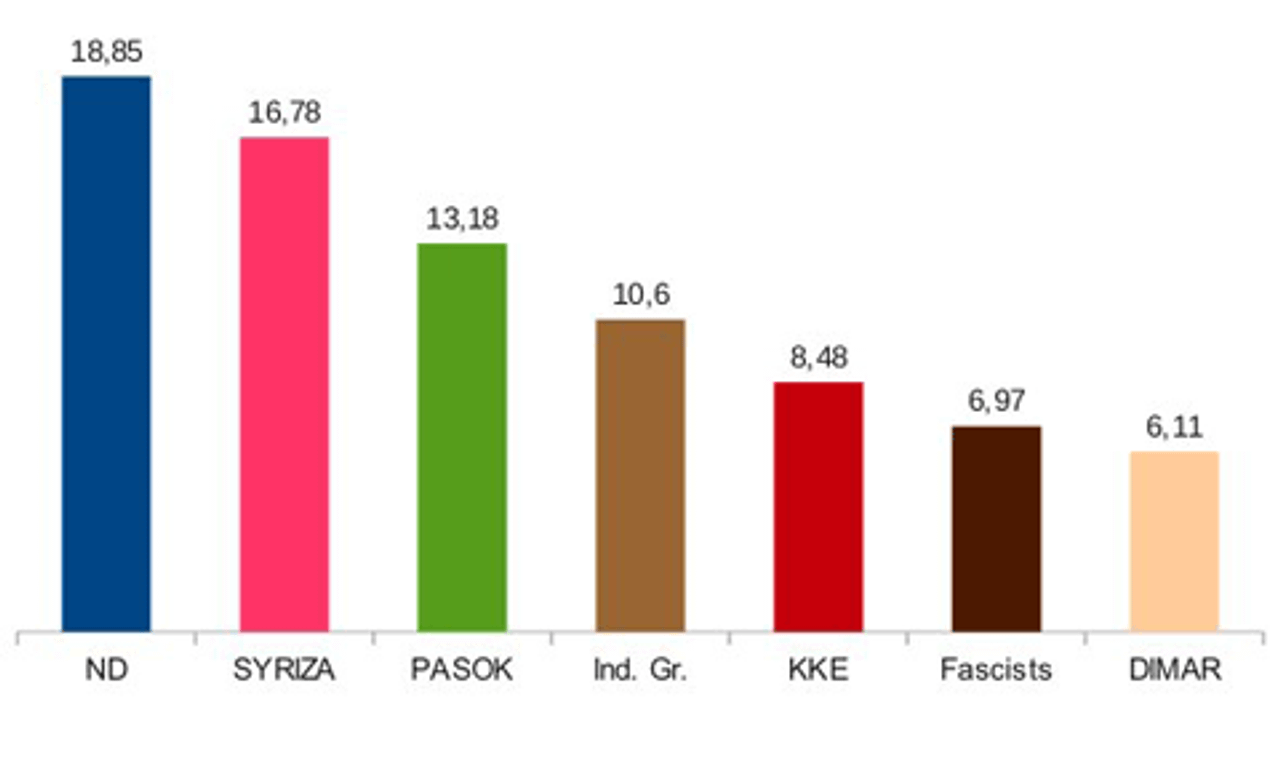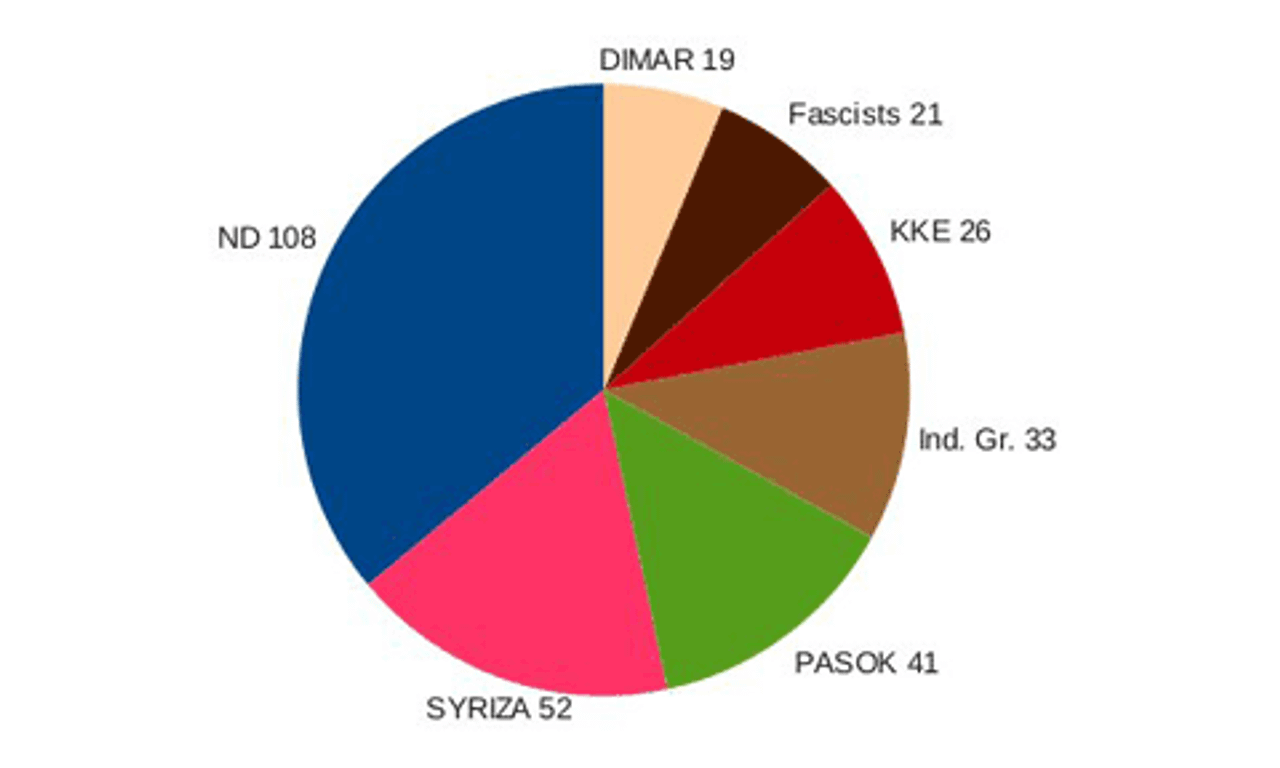Last Sunday’s elections in Greece amounted to a popular referendum over the austerity measures dictated by the European Union. The previous ruling coalition of PASOK and New Democracy (ND), the parties responsible for implementing the austerity measures, received only one-third of the votes. Moreover, almost 40 percent did not even bother to vote.
 Election results in percent
Election results in percentRepresentatives of the EU have responded to the Greek vote by aggressively insisting that austerity measures must go forward, regardless of popular sentiment. They have made it clear that they will not agree to a renegotiation of the fiscal pact but would rather see the country thrown out of the euro zone.
“Greece must be clear that there is no alternative to the restructuring programme that was agreed if it wants to remain a member of the euro zone,” Jörg Asmussen, a member of the European Central Bank’s directorate, told Handelsblatt.
EU Commission President José Manuel Barroso threatened the country with a “disorderly state bankruptcy” if it did not accept the EU decisions. The president of the European Parliament, Martin Schulz (of the German Social Democratic Party), made specific reference to the coalition negotiations: “The Greek parties should be aware that a stable government, which keeps to agreements, is a prerequisite for further support from the euro zone countries.”
According to the Süddeutsche Zeitung, the troika of the EU Commission, European Central Bank and the International Monetary Fund has cancelled its planned mid-May visit to Athens. Meanwhile, the European Financial Stability Facility announced that it would withhold €1 billion from a €5.2 billion loan installment that will be allocated on Thursday.
The EU is threatening that any new government, irrespective of its composition, must fall into line with its dictates. The alternative is a state bankruptcy with devastating consequences. Pensions, wages and benefits could no longer be paid. Expulsion from the euro zone would result in hyper-inflation, destroying savings and wages overnight.
The way in which EU representatives are ignoring the election results points in the direction of dictatorial and authoritarian forms of rule. They pose the necessity for the mobilization of the working class throughout Europe in opposition to the corporate and financial elite. However, none of the parties winning seats in parliament on Sunday is prepared to oppose the dictatorial demands of the banks. Instead, negotiations are being held about how to bring about a stable government in the interests of the EU and the Greek ruling class.
On Monday, Antonis Samaras, chair of the conservative New Democracy, was first to receive a mandate to form a government. ND only narrowly emerged as the strongest party, with its share of the vote falling from 33.8 percent in 2009 to only 18.8 percent. Despite this near collapse, it replaced the social-democratic PASOK as the party receiving the most votes. Under the country’s undemocratic electoral law, this means that it receives 50 extra seats.
 Seats in parliament
Seats in parliamentAs a result, even though New Democracy lost nearly half its vote, its share of the seats in parliament actually rose from 91 to 108. This gives it more than one third of the 300 seats and effective veto power over any coalition government. The two former coalition parties, ND and PASOK, while repudiated at the polls and winning barely 30 percent of the vote between them, control 149 out of 300 seats, a near-majority.
Samaras did not make any serious attempts on Monday to persuade another party to join the government. After just a few hours, he said his efforts had failed and asked the president to charge the second-place party with forming the government. This is the Coalition of the Radical Left (SYRIZA), led by Alexis Tsipras.
On Wednesday evening the media reported that Tsipras’s overtures had failed, and he was transferring responsibility for forming a new government to Evangelos Venizelos of PASOK, the third strongest party. If he also fails, final negotiations between the representatives of all parties would take place led by President Karolos Papoulias. Should these negotiations fail, then new elections would follow, no later than June 17.
The fact that Tsipras accepted the mandate to form a new government is significant. He is seeking to find a political mechanism to control growing popular anger, while at the same time implementing the EU demands on the basis of some cosmetic changes. This was indicated by his readiness to meet with the new French president François Hollande—who is committed to implementing budget cuts in France—during the talks on forming a new government.
Tsipras sought to put together a left majority comprising SYRIZA, the Communist Party (KKE), and the Democratic Left (DIMAR), a right-wing breakaway from SYRIZA. However, in order to achieve a majority, such a coalition would also need the support of PASOK and the right-wing populist Independent Greeks, a breakaway from New Democracy.
On Tuesday, Communist Party chair Aleka Papariga said the KKE was not prepared to enter a coalition with SYRIZA. The only remaining option for Tsipras was to work with the conservative ND, which clearly supports the EU’s austerity measures and has implemented them over recent months as part of the outgoing government.
Following the rejection from the KKE, Tsipras offered to cooperate with both ND and PASOK. Even before the negotiations on Wednesday evening, he called on them to write a letter to the EU Commission withdrawing their agreement to the austerity measures.
In addition, he presented a five-point plan as the basis for any coalition talks. The first two points call for a halt to all upcoming social cuts and attacks on wages and conditions. The third point targets immunity of ministers from prosecution, while the fourth calls for an investigation of the banking sector. There should also be a moratorium on debt payments pending an international investigation of the causes of Greek government debt, Tsipras said.
This plan reveals Tsipras’s intentions. During the election campaign, SYRIZA declared that it wanted to reverse all cuts. Now Tsipras is demanding only that future cuts be halted. Above all, SYRIZA’s political direction is clear from its position on the EU. The party has several times stressed that under no circumstances would it agree to withdrawal from the EU.
Recognition of the EU has its own logic. It means recognizing the diktat of the troika. While EU representatives ignore the results of a democratic vote and openly threaten the elected parliamentarians, Tsipras wants to sit at the table with them and renegotiate the terms of the austerity measures. His claim that this is possible is a deliberate exercise in duplicity.
That Tsipras wants to negotiate with ND and PASOK shows his main concern is forming a stable government that is able to push through the required cuts against the workers. In this, like PASOK, he is relying on the unions, with whom he already held talks on Wednesday.
This approach follows the logic of SYRIZA’s whole development, which parallels other parties such as the Left Party in Germany or Rifondazione Comunista in Italy, both of which have already been involved in governments imposing social cuts. SYRIZA has played a similar role in local and regional coalitions with PASOK.
SYRIZA has rested on better-off academic and middle class layers, which explains its traditionally low vote. In these elections, the group won the vote of broader layers affected by the cuts. It finished first in Athens, Piraeus and Thessaloniki, the three largest urban centers. According to the Süddeutsche Zeitung, the coalition polled well among hospital doctors, pharmacists and above all civil servants who had previously voted for PASOK.
Undoubtedly the rise in votes for SYRIZA expresses the deep opposition to the social counterrevolution implemented by the EU and the Greek elite over recent years. SYRIZA will not meet these expectations in the slightest. Any government in which they participate will be rapidly confronted with massive opposition from the working class.
